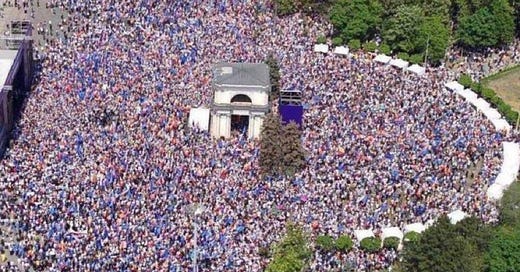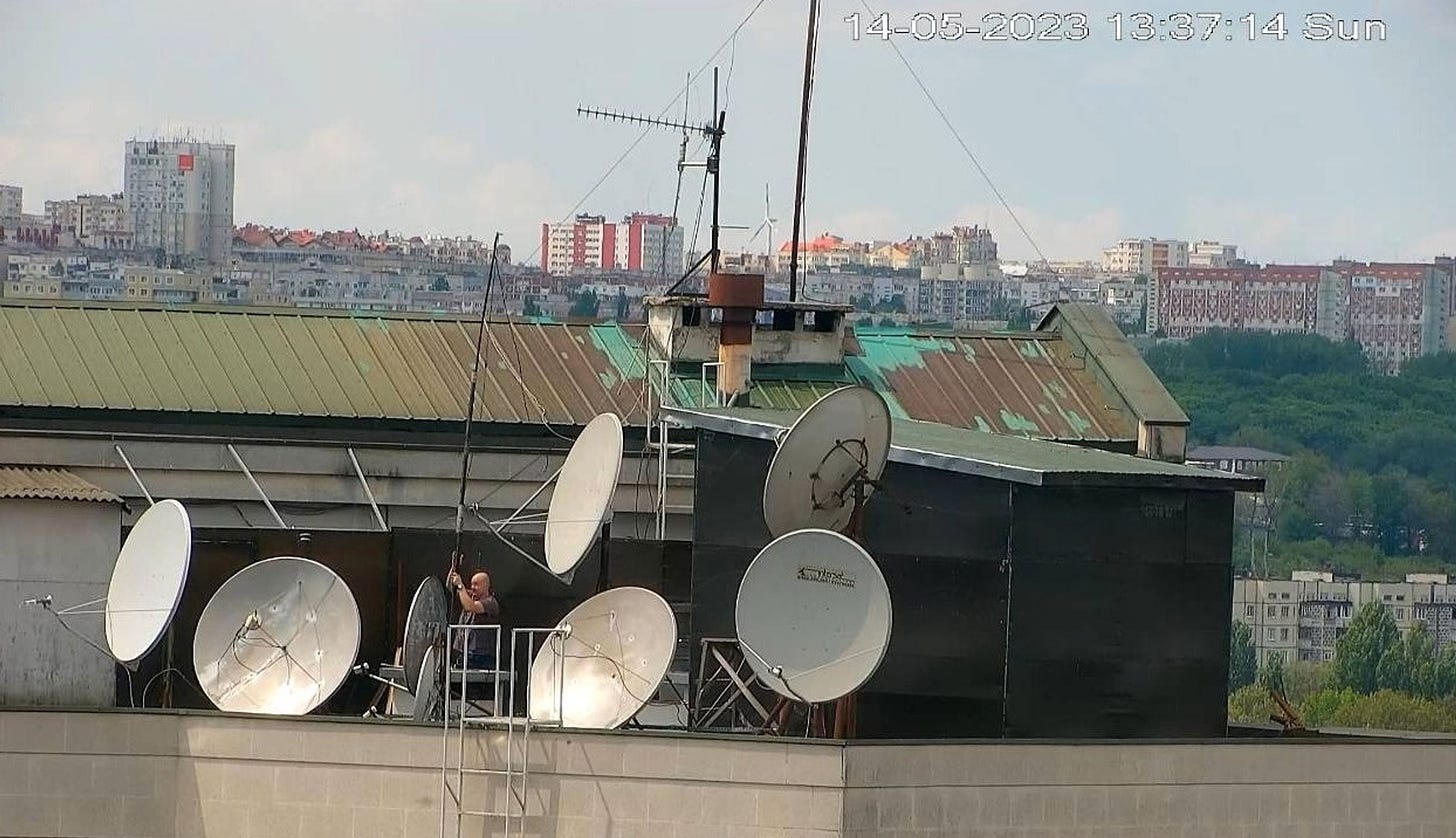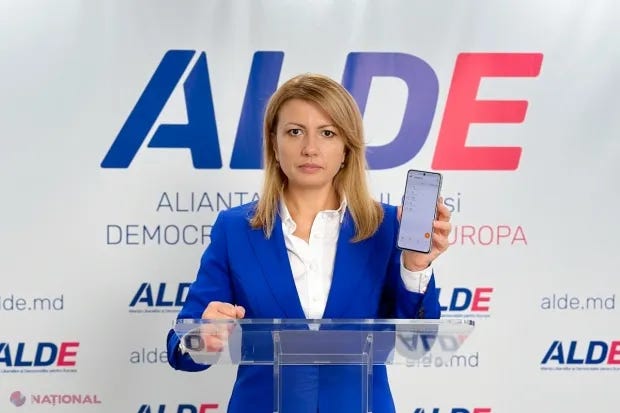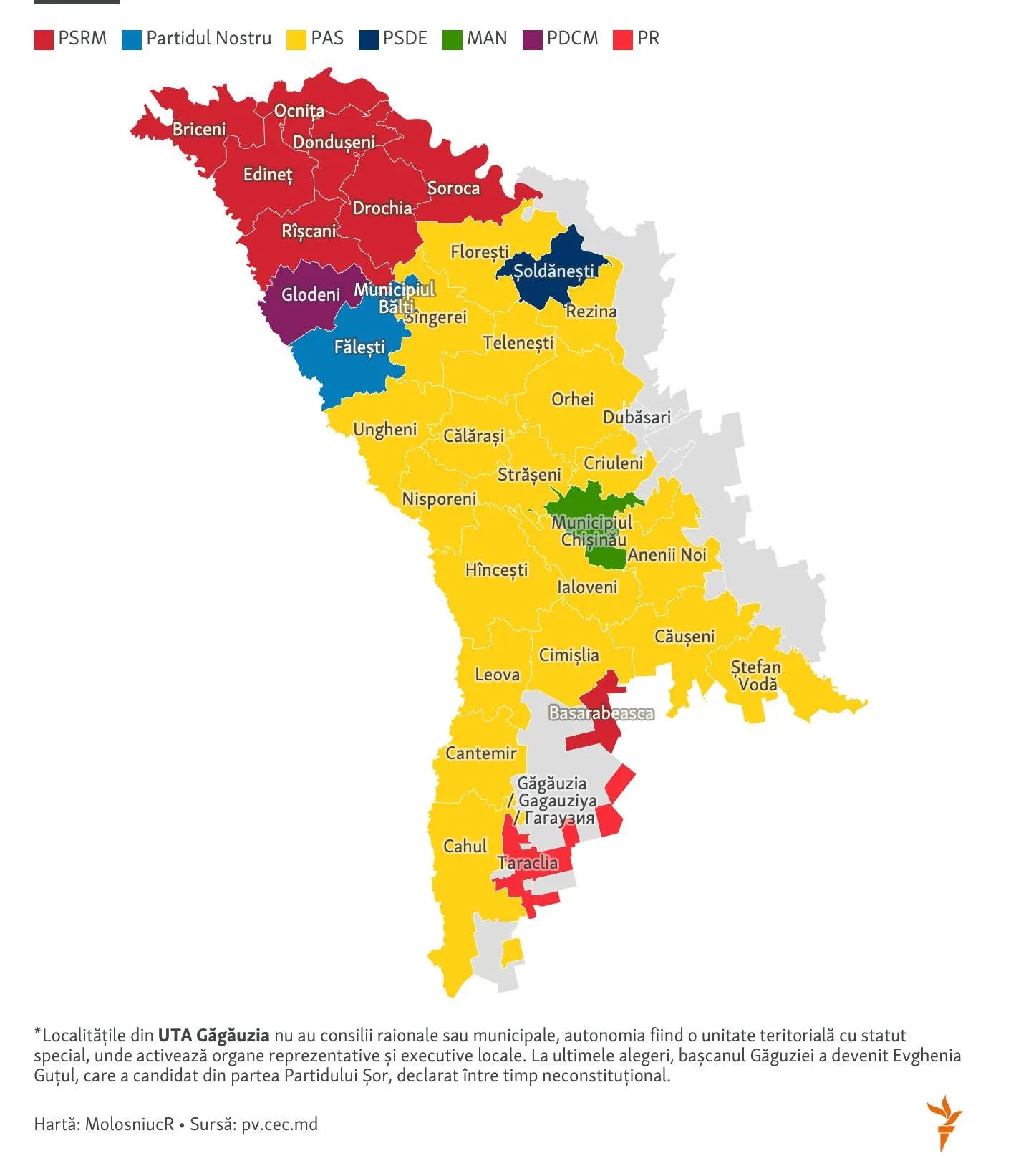Saying that 2023 was a big year for Moldova is quite the understatement. Over the course of 90 Moldova Matters articles this year we’ve followed a year of tumultuous, heartbreaking, confusing, nerve-wracking and occasionally triumphant events. Today we’re going to take a look back over 2023 to try and pull together an idea of what all this has meant.
Quick Note: All the links in this article are to past Moldova Matters articles from the year unless otherwise noted.
January - the Energy Crisis begins to abate
At the start of this year the energy crisis that gripped Moldova though last winter had begun to abate. November and December had seen blackouts, collapses in consumer spending and general worries and fears about the price and availability of natural gas and electricity around the country. In December, the government had successfully negotiated with the Transnistrian MGRES power plant for a steady supply of electricity in exchange for the breakaway region taking the whole supply of natural gas from Russia. Moldova meanwhile was buying gas on the European market for less than the price offered by Russia. The combination of energy deals, subsidies for households, and general falling prices due to a warm winter meant that the worst of the crisis was passing.
Russia continued to pummel Ukrainian energy infrastructure, but bringing MGRES back online also helped stabilize the grid in the Odesa region as well. Stray missiles began falling in Moldovan farm fields for the first time as the war continued to threaten spillover. Things were not “good” in Moldova or the region, but there was now a feeling that we could get to spring without catastrophic shortages.
Otherwise, January was a slow news month. This is pretty normal in the wake of the holiday season in Moldova that stretches from “new” Christmas on December 25th through “old” Christmas on January 6th right up to “old” New Years on January 14th. Moldovans traditionally like to celebrate each holiday at least twice which leaves comparatively little time for major news events.
One particularly fun story from the month concerned a man in Stefan Voda who was spotted by his neighbors out for a walk with a lion. Here’s an excerpt of our article about the police investigation:
Police discovered that the lion was on a walk with its owner, a local man named Ion Bulmaga. Mr. Bulmaga stated to police that the lion was a gift from the Odessa Zoo in appreciation of the work that he had done helping Ukrainian refugees. He claimed that while he had not yet registered the animal in Moldova all its documents were in order in Ukraine. In response, the Odessa Zoo categorically denied this stating that they are not in the habit of giving lions out to anyone.

Sadly we never found out what became of this story as the events of February quickly took over the news and fun human interest stories got drowned out by the roaring tide of events that would define 2023.
February - the Government *did not* collapse
Early in the month rumors started swirling that Prime Minister Natalia Gavrilita would be replaced in a government reshuffle. Initially this seemed unlikely as the Prime Minister was in Brussels meeting top EU leaders in the days running up to her eventual resignation. The rumors turned out to be true and Prime Minister Gavrilita resigned, or was pushed out depending on your opinion, and swiftly replaced by Prime Minister Dorin Recean.
This whole situation was clumsily covered in much of the international press, notably the Wall Street Journal, which sought to cast the situation as a “government collapse.” In reality it was a reshuffle, most likely triggered by PAS leadership and President Sandu. Former PM Gavrilita herself called the change a switch from an economic to a security focus. Other opinions were manifold but the end result was a new PAS government with some new ministers under the same political leadership.
In parallel with this political drama, President Sandu held a national press conference where she stated that Russia was preparing a coup d'etat in Moldova. In the statement, which we printed in full at Moldova Matters, the President explained that Moldovan and Ukrainian security services had uncovered detailed plans for the use of protests to disguise violent actions aimed at overthrowing the state. The President called for maximum vigilance from the security services and noted that Russia’s hybrid war against the country was moving away from the energy crisis they created and into a new and violent phase.
Following this news, a number of new security protocols were put in place. A soccer game between Sheriff Tiraspol and Serbian FC Partizan was played without fans when the Serbian fans were prevented entry to Moldova on intelligence from SIS that infiltrators were amongst their ranks. Moldova then canceled commercial flights as Moldova and Romania began responding to various unidentified objects, possibly balloons, violating the countries’ airspaces. This caused Romania to scramble a number of aging M-21 Lancers to investigate - where they found nothing.
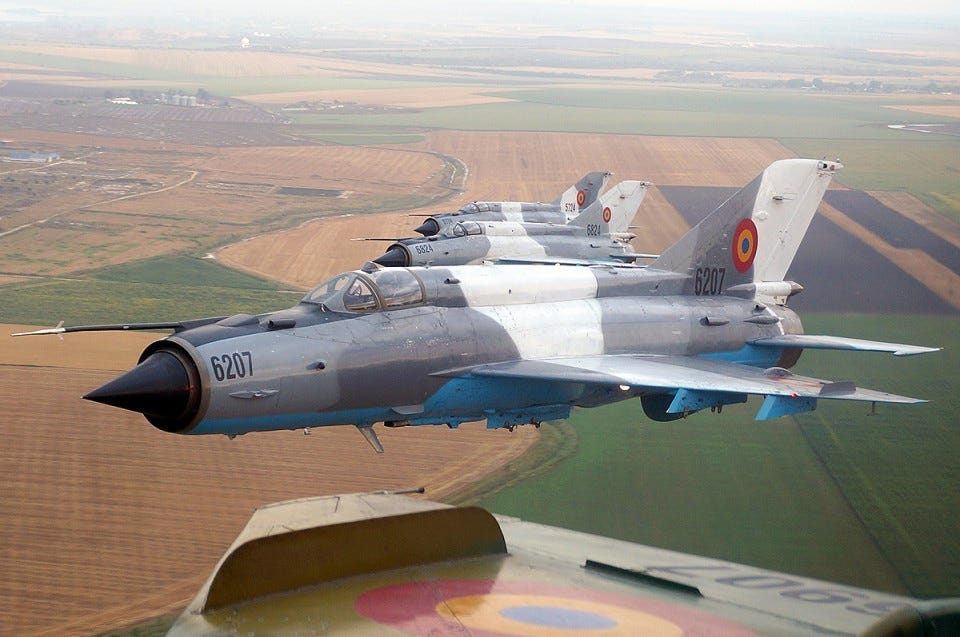
An atmosphere of tension was brewing as winter gave way to Spring and a new phase of Russian hybrid aggression began.
March - Shor “Protests” and tensions in Transnistria
The month opened with Parliament voting to clarify the long simmering question of what language the country actually speaks. Diving into the “Moldovan” vs Romanian language issue has traditionally been less of a political “hot-potato” and more like grabbing the third rail with both hands. The PAS faction in parliament used a clever political strategy based on past court rulings to definitively recognize the national language as Romanian and bypass the 2/3 constitutional amendment threshold traditionally assumed to be needed to settle the issue. There were opposition protests, some mild fist-fights in parliament and then it was done. Actually done. One of the most contentious political issues haunting Moldovan politics since independence was put to bed and that was that.
There was little time to dwell on this however, as the Transnistrian “authorities” stated that they foiled a major Ukrainian plot designed to assassinate all the region’s leadership and inflict maximum civilian casualties. The alleged plot involved a car filled with the explosive RDX, people sneaking into the region via goat paths, camera’s hidden in bricks and a mastermind who was apparently a convicted pimp. They claimed to have arrested 2 persons involved in the plot and extracted confessions from them.
The Moldovan and Ukrainian authorities denied knowing anything about these strange events and holes began developing in the story almost immediately. Investigations by Moldovan journalists quickly turned up problems in the video taped “confessions” which never actually mentioned violent acts at all. Then the Transnistrians changed their story stating that the real targets were European and American diplomats with the OSCE - making things even more implausible for a supposed Ukrainian plot.
Whatever the truth of the situation, tensions had risen again between Tiraspol, Kyiv and Chisinau.
Following this, investigative journalists at RISE reported on a document obtained from within the Kremlin outlining Russia’s plan to destabilize and subjugate Moldova. This resulted in some excellent reporting from CNN but was mostly met with a shrug in Chisinau as people have gotten pretty used to the idea that Russia is not Moldova’s friend.
In parallel the Shor party increased their street protest activities and indications that they could turn violent were more or less everywhere. Police reported capturing and detaining 2 Russian agents who were passing out money to people in exchange for starting riots. A member of the Wagner mercenary group was detained and deported after attempting to enter the country, and the game of capturing Shor couriers transporting large sums of cash to bribe protestors and rioters got going in earnest.
While this all resulted in a steady drumbeat of concerning news stories, it did not spark mass protests as Shor and the Kremlin hoped. The strategy seemed to envision a small core of aggressive, even violent, paid protestors that would spark a popular revolution against the government. Instead, protest remained relatively small and rioters and agitators were detained and arrested. Other opposition parties chose to stay away from the Shor events and average citizens found the whole thing worrying rather than “inspiring.”
April - Political Moves and Countermoves
Against the backdrop of the ongoing protests and security concerns, President Sandu announced that a “Grand National Assembly” would be held in support of European integration on May 21st. Her speech, which we printed in full in Moldova Matters, was by far the strongest and most direct of her Presidency to date. It is worth re-reading in full, but we’ll print an excerpt from the closing here:
Now is the time to unite and become part of the European family together. I come with this exhortation, because at crucial moments big decisions are not made only by politicians. Big decisions are made by the people in the Grand National Assembly Square.
We are at a great crossroads. What we do now will affect our lives, our children's lives and our children's children's lives. Future generations will look at how we behaved in these times and ask - what did we do to defend our country. What have I done to be part of the civilized world that solves problems without war? What have we done for future generations to protect them from harm? How did we come together and decide that the fate of our children will be a future of peace, understanding and prosperity?
On May 21, 2023 we will gather to answer these questions together.
I am waiting for you at the Moldovan European National Assembly"
These powerful words served multiple political and social purposes that we analyzed in the article about the speech. But the main idea was simple, Moldovans must unite against these outside attacks, Moldovans can choose their future and the time for choosing is now. The speech, as well as the assembly the followed in May began to turn the tide of fear and pessimism that had dominated through the winter and regained political momentum for pro-European forces in Moldova.
It didn’t hurt that also in April Ilan Shor’s court case was finally and unexpectedly resolved after languishing in appeals that began in 2019 following his first conviction in 2017. The fugitive oligarch was sentenced to 15 years in prison in absentia for his role in the Theft of the Billion.
In a more concerning story, Russian “peacekeepers” on the Dubasari peninsula staged a provocative show of force on territory controlled by Chisinau outside the Transnistrian region. Moldovan border guards briefly believed they were under attack as Russian soldiers and an armored personal carrier appeared to surround their checkpoint before withdrawing when Moldovan police arrived as backup. This strange situation got very little press, even in Moldova, but represented one of the most overtly hostile moves by Russian troops in Transnistria since the beginning of the war. We ran an article in Moldova Matters explaining the complex geography of the security zone and detailing step by step what happened and what it could mean.
May - The Grand National Assembly
The news in May was dominated by stories of preparation, both for the Grand National Assembly on May 21st and for the European Political Community EPC Summit that Moldova was set to host on June 1st.
Lots of new security protections were put in place around Chisinau and residents saw a Black Hawk helicopter buzzing over the streets for the first time as Polish police special forces trained with their Moldovan counterparts. Protests from Shor continued and the Gagauzian elections resulted in Shor’s candidate Hutsel being elected in a contentious second round vote, but most people were looking forward to the big events.
And the Grand National Assembly was big. Really big. The event drew crowds in excess of 75,000 people into the center of Chisinau and was headlined by speeches from President Sandu and European Parliament President Roberta Metsola.
Supporting rallies were held by the diaspora in Bucharest, Iasi, Dublin, London, Kyiv, Brussels, Vienna, Strasbourg, Rome, Milan, Prague, and more.
Around the world coverage stressed just how huge the crowd was and how enthusiastically people chanted “Europe! Europe!” Photos of the historic event appeared in stories in the BBC, RFERL, Reuters, Al Jazeera, France 24, EURACTIV, Politico and more.
Juxtaposed against the few thousand people that showed up to Shor’s counter-protests, Moldova had sent a powerful message on the unity of the nation in pursuing a democratic, European future.
June - the EPC Summit
The hosting of the EPC Summit on June 1st was a diplomatic triumph for Moldova. For a day the small town of Bulboaca, less than 20 km from the nearest Russian soldiers stationed in Transnistria, became the center of Europe. Summing up the event Foreign Minister Nicu Popescu said:
“The heart of Europe beat in Bulboaca. Almost 50 heads of European states and governments were impressed by our society and culture…They also liked our wine, nature, hills, vineyards, Mimi castle, Chisinau and people. This is a huge success, and it is not only symbolic. This is a success that convinces many countries that Moldova deserves to be in the EU,”
If anything, he was underselling the success of the event. Heads of state, journalists and dignitaries all walked away highly impressed with Moldova’s organization and management of the event.
I was lucky enough to cover the event alongside local and international press and wound up writing a whopping 10 articles covering the preparations for the summit, seven articles from the summit itself (one, two, three, four, five, six and seven), a full printing of President Sandu’s national address following the event, and a final article analyzing the summit and what it all meant. This was the biggest diplomatic event in Moldovan history and it could hardly have gone better.
Also in June, the Shor Party was ruled unconstitutional and disbanded. Moldova held its breath as the world collectively watched the Wagner “Mutiny” and tried to figure out what the hell was going on in Russia. And a tragic shooting unfolded at the Chisinau airport which caused a major re-evaluation of security procedures (we covered this in 3 articles Part 1, Part 2, Part 3.
July - August: Russian spies, a Cabinet Reshuffle and more
The summer months of July and August were hardly quiet in Moldova, but there wasn’t any one overarching theme to the news as there had been through much of the first half of the year. Prime Minister Recean announced a cabinet reshuffle selecting new ministers of Infrastructure, Internal Affairs and Education. Russia stepped up its attacks on Ukrainian grain export infrastructure striking Odesa nightly and beginning a campaign of attacks against Ukraine’s Danube River Ports that threatened to spill over into Romania. Multiple rifts within PAS began to appear as the party struggled to move forward on Justice Reform and the processes of pre-vetting and vetting were slowed by court rulings and political disagreements.
In some of the most contentious news of the summer, reports emerged of Russia’s extensive spy network and electronic surveillance operations that were run out of the Russian embassy in Chisinau as well as consulates around the country and in Transnistria. This created even more diplomatic tension between Chisinau and Moscow and resulted in the expulsion of 22 Russian diplomats and 23 technical staffers from the country.
September - October: Run-up to Local Elections
In the early fall months the dominant story in Moldova was all about the lead up to local elections. In a normal election year that would be about candidate selection, parties’ prepping their political messages and a whole lot of tents and volunteers stopping you on the street and asking you to vote for their candidate. This year all of that was happening, but the main story was a cat and mouse game between the police and Shor affiliated couriers moving illicit money and other bribes around the country.
The biggest story in this ceaseless back and forth was the revelation that politician Arina Spataru had been approached by Shor with a large bribe to join one of his many parties, cooperated with prosecutors and then gone undercover to expose the scheme. This operation was overseen by Anti-Corruption Prosecutor Veronica Dragalin and contributed to the arrests of multiple political figures who were allegedly enticed by Shor with large bribes to change parties - in some cases defecting from the Socialists.
Spataru, who the press started calling Arina-007, became an instant celebrity and the whole case drew a lot of attention to Shor’s attempts to buy politicians and voters in the lead up to the election. Shor admitted as much in a video where he actually asked for the bribe money back. This all led to speculation that Spataru and her ALDE party would emerge as a major new pro-EU party in the elections. That did not come to pass and the whole thing turned out to be a 15 minutes of fame situation - though one that probably had a major effect on how the public viewed the elections.
The story was just one particularly salient moment in a saga of arrests, bribery, political defections and new Shor related political parties sprouting like mushrooms. With Shor’s main party, the “Shor Party,” having been ruled unconstitutional he put most of his focus on the “Chance” party, whose Romanian acronyms was “Shor.” This would become salient in November.
In other October news Moldova and the world reacted with horror to the October 7th attacks in Israel perpetrated by Hamas terrorists. One Moldovan citizen was killed in the attacks. The Moldovan government expressed solidarity and support for Israel while working with international partners to try and evacuate Moldovan citizens who became trapped in Gaza. This was a long process but eventually all Moldovans were evacuated via Egypt.
Finally, in September Moldova Matters added a “Culture” section and began a collaboration with Journo Birds. These articles have spanned various topics including Moldovan wine culture, buying a village house for 1000 euros, growing your own organic food and much more. Readers have mostly sent positive feedback about articles that show Moldova in a different light, but those who don’t want to receive these emails can update their subscription to opt-out of the sections “Culture & Life” and “Discover Moldova.”
November - Local Elections
All of the police and security services work leading up to the elections finally culminated in a decision on November 3rd to remove the Chance party and all of its candidates from the November 5th election. While ample evidence was presented on the criminal activities of the Shor affiliated Chance party, the decision to remove them 2 days before the election caused shock and in some areas outrage. Shor’s team pivoted quickly to inform voters about other Shor affiliated parties and candidates in their localities. The whole process was a mad scramble of action and counter-action with daily stories about police seizing large amounts of money destined for one constituency or another. Shor’s team organized a complex scheme to bribe voters that resembled a multi-level marketing scheme whereby people earned money by passing out money to voters and recruiting more people to do so. Ordinary people called the police to report this and the cycle of cat and mouse continued right up until election day.
In the end, the elections themselves went off without much in the way of disruption. PAS and the Socialists both claimed victory with various accomplishments at the local level that they could point to. Mayor Ceban handily won re-election in Chisinau granting the biggest electoral prize to his newly formed MAN party. Shor maintained power in Orhei and Taraclia but otherwise failed to make serious gains.
You can read a detailed analysis from Moldova Matters in our article summing up the results. But the basic picture was that the results were mixed and no one party could claim a clear victory without substantial caveats. In such a situation, everyone claims victory - which is what happened.
In other news, November was when the budding schism within the Orthodox Church in Moldova really got moving. The increasingly tenuous position of the Russia affiliated Moldovan Orthodox Church has drawn many political and cultural distinctions to the fore as most institutions of Moldova are forced to re-align to the new geopolitical realities.
December - Negotiations Begin
December began with Moldova and southern Ukraine dealing with the fallout from a major blizzard that rolled in from the Black Sea. Cars were stranded on roads and multiple people died waiting for rescue in both Moldova and Ukraine. After last year’s warm winter a November blizzard seemed to portend a much colder one this year. That turned out not to be the case (yet) and the weather outside on December 31st is a comfortable 10 C (50 F).
Besides the weather, December was a month for major announcements. On December 14th Charles Michel, President of the European Council announced on Twitter that there was a decision for the EU to begin accession negotiations with both Moldova and Ukraine. This agreement came about after some savvy political moves by German Chancellor Olaf Scholz which helped neutralize Hungary’s Viktor Orban’s opposition. We discussed this in detail in an article about the announcement, reactions and implications.
Following this news, President Sandu announced her re-election bid this week as well as a referendum on EU accession on the same day. We just sent the article about that to you this week so there’s no sense re-hashing it here. Suffice to say the year has ended with major announcements and a strong feeling that as tumultuous as 2023 was, 2024 will be an even more complicated and important year in Moldova.
Looking Back at 2023
It should go without saying that this has been quite a year in Moldova. Looking back it is hard to even get your head around how much has happened and how much has changed. Broadly speaking the story of the year has been the hybrid war being waged against Moldova by Russia - primarily through Ilan Shor and other Kremlin proxies. This went in distinct phases: The winter 2022 - 2023 energy crisis; Spring protests, riots, coup attempts; and Fall election subversion attempts / local election shenanigans. Each of these phases has had different impacts on average people’s feelings of security and optimism about the future. Looking back, it is possible to say that the year has largely been a story of hopes and confidence successfully pushing back against the fears and uncertainty of 2022. This has been due to politicians, civil society groups and average people. It has also been massively supported by Moldova’s ever increasing number of friends around the world and especially in Europe. The decision to begin EU accession negotiations emphasizes how far Moldova has come in the face of adversity.
At the end of 2023 most people would not say that things feel “good” in Moldova. But by looking back over the tumult of the year it is possible to say things are “better,” and that 2024 may be better still.
Moldova Matters in 2023
In addition to covering the weekly news this newsletter has taken time to dive into a lot of other issues throughout the year. I wrote an article on how to best spend 48 hours in Chisinau (partly in the hope that it would help some of the 700 journalists expected to show up for the EPC summit and be stuck here for a few days). Moldova Matters published its 200th article, though this milestone is quickly receding into the past as the pace of news and publishing increases. I wrote multiple economic deep-dives including a look at Moldova’s SRL / LLC reform laws and an explainer on salaries, taxes and the serious outbound migration problem in Moldova.
I also wrote an article entitled “Transnistria is in a Pickle” which looked at the serious challenges that the breakaway region will face in 2024. This will likely be a major focus of news and politics in the coming year.
Finally, I published an article called “So who writes this anyhow?” taking a moment to introduce myself and my background after a number of readers reached out with questions. Going into 2024 I plan on leveraging more of my experience and background to focus more on articles explaining the political and economic dynamics underlying the current status quo in the country.
Moldova Matters would not be possible without all of you who read this newsletter. I cannot begin to tell you how many kind emails I have gotten this year from readers around the world. Many people just want to say hi. Others have specific questions and want to dive into a topic more. Still others send me corrections - which like all the other emails are exceedingly polite and constructive. After nearly 3 years of writing this newsletter I have become convinced that my readers are quite an awesome group of people. Please keep sending comments, emails and reaching out. It’s a pleasure hearing from you all.
So that’s it! and what a 2023 it’s been! Thank you again for the support. For subscribing, for sharing and for just being very supportive of this effort. I look forward to writing a lot more in 2024 and it means a lot to me that so many people read this newsletter.
Happy New Years and see you in 2024,
- David Smith

